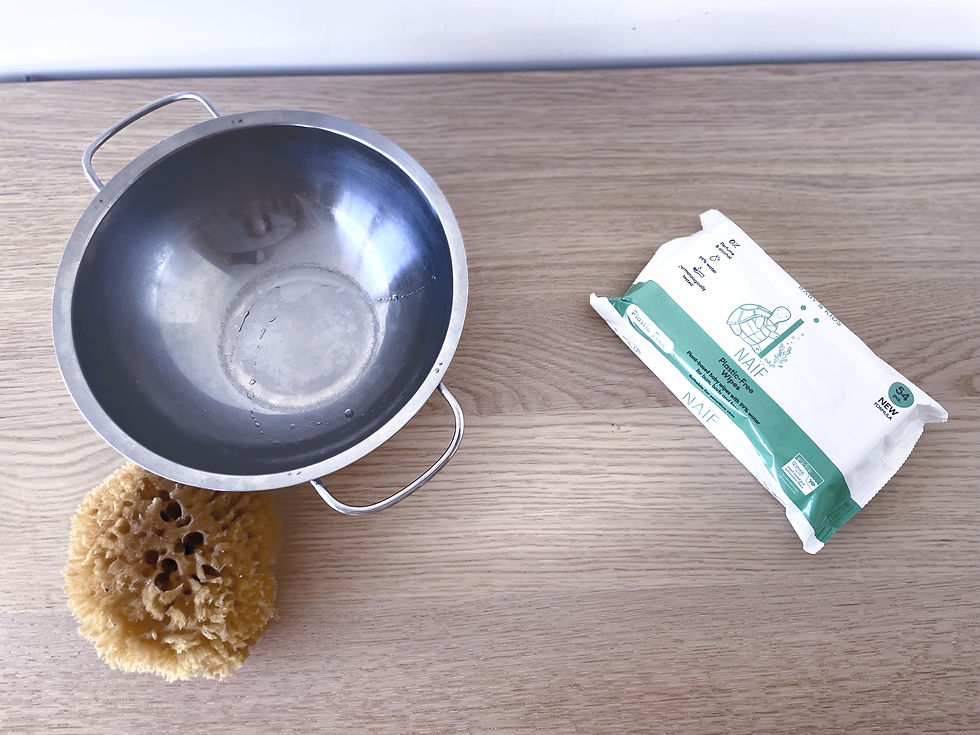Eco-Friendly Nappy Changing: Benefits of Using a Basin and Sponge with Reusable Nappies for Your Baby.
- Raquel

- Oct 31, 2024
- 3 min read
In a world where more and more families are striving to reduce our environmental impact and choose healthier options for ourselves and our babies, nappy changing can be a key area to adopt sustainable habits. Using a basin and sponge instead of traditional disposable baby wipes is an excellent step towards a more eco-friendly approach to parenting, especially when paired with the use of reusable nappies for babies.

It’s funny that we talk about “traditional disposable wipes.” But the truth is, since they arrived in Europe in the 1980s, they’ve only become more common as the standard for baby hygiene. Before that, it was usual to use a basin with water and a sponge or washable cloths.
This alternative approach to cleaning is not only more environmentally friendly but can also be gentler on your baby’s sensitive skin and more cost-effective over time.
In this article, we’ll explore the benefits of using a basin and sponge when changing your baby’s nappy and how this practice aligns perfectly with the commitment to cloth nappies. If you’re looking for ways to make your baby’s care more eco-friendly and mindful, keep reading to discover all the benefits of this natural baby hygiene option!
Benefits of Nappy Changing with a Sponge and Water: The Alternative to Disposable Wipes.
Eco-Friendly 🌿: When we use a basin and sponge for our baby’s natural hygiene, we produce less waste than with disposable wipes, helping to reduce the environmental impact of nappy changing.
Cost Savings 💰: In the long run, using water and a reusable sponge is also a financial advantage, especially with reusable nappies, as it saves on buying disposable wipes regularly.
Fewer Chemicals 💚: Disposable baby wipes often contain chemicals and fragrances that may irritate your baby’s skin. By using water and a sponge, you can avoid these ingredients and have control over the products you use (if you choose to add soap, for example). This promotes a more natural hygiene and care routine for your baby. Plus, it saves you the hassle of investigating what’s really in those “natural” wipes often marketed to us but which we all know aren’t always so.
Gentler on Skin 🚼: Water and a sponge can be gentler and less abrasive on the baby’s sensitive skin, especially if they have rashes or irritation. This is also a plastic-free baby care option.
Flexibility: You can use warm water, which is pleasant for your baby and helps clean more effectively.
By choosing a basin and sponge, we opt for an eco-friendly alternative for our baby’s hygiene and care. This doesn’t mean compromising on practicality in our day-to-day routine. Disposable wipes are a convenient option for nappy changes when out and about, but they’re perfectly compatible with using a natural sponge and basin at home, creating an eco-friendly nappy-changing routine for most occasions.
At our parents' homes, we keep a sponge and basin so we can use them there when we change our little one’s nappy. When we’re out, we use 100% biodegradable disposable baby wipes.
The only important thing to keep in mind when using water and sponge for sustainable nappy changes is to do the following regularly to avoid bacterial build-up and, in turn, extend the life of the sponge:
Rinse the sponge well after each use (not much of a surprise, I imagine, as it’s something we all do when using sponges in the shower, for example).
Full Drying: Allow the sponge to air dry fully before using it again, and if it can dry in the sun, even better. This helps prevent bacterial growth.
Regular Disinfection: There are various ways to disinfect the sponge: with baking soda, white vinegar, bleach… we prefer the boiling water method. Soak the sponge in hot water for 5 to 10 minutes, and it’s good to go.
Periodic Replacement: As a natural product, the sponge will need replacing over time. If you take good care of your sponge, it’ll last longer, but as soon as you notice it starting to break down or lose quality, replace it.
These methods will help keep the sponge clean and safe for the care of your baby’s delicate skin.
As an additional tip, I recommend avoiding overly porous sponges.
And if the sponge isn’t quite for you, you can always consider washable cloths. You just need to toss them in the washing machine with the UnuPana reusable nappies, and they’re ready to go 🤗
I hope you found this article helpful. As always, I’d love to hear from you in the comments or on our Instagram 😊




Commentaires